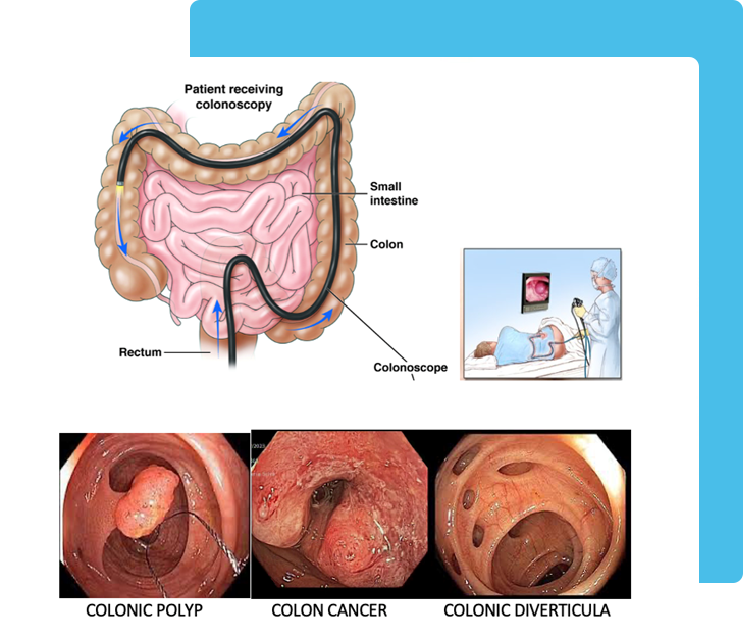
- Appointments
- Sunnybank 07 3344 1440
- Mater Health Hub 07 3041 5082
Colonoscopy is the endoscopic examination of the large bowel and the distal part of the small bowel via use of a long flexible tube with a fibre optic camera attached at the end and passed through anus. This procedure can help to identify varieties of bowel pathologies and doctor can take biopsy or remove polyp at the same time.
It is a gold standard test for diagnosis of Polyps and bowel cancers.
A colonoscopy is indicated to screen for bowel cancer in certain situations such as a relative with diagnosis of bowel cancer, a family history of polyposis syndrome, a positive National Bowel Cancer Screening stool test or abnormal imaging like CT scan.
A colonoscopy may be recommended if you have rectal bleeding, or bowel symptoms such as a change in bowel habits, abdominal pain, bloating, or the passage of mucous or iron deficiency anaemia or unexplained weight loss.

A colonoscopy procedure requires a clean bowel to properly inspect colon. If the bowel is not clean (poor prep), it increases the risk of missing pathologies, risk of complication and need for repeat procedure. Preparation includes:
Colonoscopy is usually done under sedation administered by your anaesthetist that helps you stay relaxed, comfortable and usually asleep throughout the procedure. Most people have little to no memory of the procedure. Your vitals like Heart rate, breathing and blood pressure are continuously monitored during procedure. Your doctor with pass colonoscope gently and carefully under vision to reach caecum or distal part of small bowel. The scope is than slowly pulled back while inspecting lining of bowels for any abnormalities like growth, inflammation. The fibre optic camera at the end of colonoscope helps to identify any pathology and also transmit the images to monitor. Your doctor make take biopsies if required or remove a growth (polyp) if detected. Rubber band ligation of haemorrhoid can be performed during colonoscopy to treat small haemorrhoids. Usually the procedure takes 20-40 minutes but it varies depending up on difficulty of procedure or additional procedure required like removal of multiple polyps.
The colonoscopy is usually very safe procedure. You may feel bit bloated after procedure due to use of CO2 gas to distend colon. Usually it settles in 1-2 hrs. You may feel sometime feel some pain at anus or abdomen and may need simple analgesia. Small amount of blood per rectum may noticed for day or so.
Serious complications are very rare and includes perforation in bowel, major bleeding, injury to other organs like spleen and serious side effect to medications. This may require admission to hospital for observation, antibiotics, repeat colonoscopy to fix the problem or rarely surgery to fix hole in the bowel.
All Copyrights © 2023 Dr. Kaushik Kumar
Powered by :: Growup Business Solution